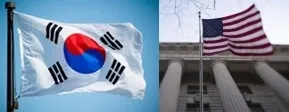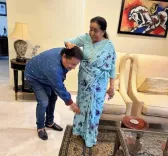Will South Korea Achieve Successful U.S. Tariff Negotiations?

Synopsis
Key Takeaways
- South Korea prioritizes national interests in U.S. tariff negotiations.
- Government collaboration with industry experts is essential.
- Local agriculture sectors express strong concerns.
- Potential trade-offs raise alarms among farmers.
- U.S. pressures Korea on various non-tariff measures.
Seoul, July 21 (NationPress) South Korea is committed to pursuing the most favorable results in the ongoing tariff discussions with the United States, as emphasized by the nation's new industry minister on Monday, just under two weeks before the August 1 deadline for negotiations with the Trump administration.
"We find ourselves in a very serious situation with all options being considered in the current tariff discussions with the U.S.," stated Industry Minister Kim Jung-kwan, as reported by Yonhap news agency.
"The industry ministry is in the process of refining its negotiation strategies in close partnership with other relevant ministries and will exert full efforts to ensure the trade talks conclude successfully.
Kim's comments were made during an emergency meeting focused on trade negotiation strategies with the Trump administration, which included officials from major business organizations and trade experts.
"We are fully aware of the concerns surrounding tariff negotiations, and by taking these sensitivities into account, we aim to achieve the best possible outcome from our national interest," he noted.
The Ministry of Trade, Industry and Energy is facing strong backlash from local agriculture and livestock sectors following Trade Minister Yeo Han-koo's statements suggesting that some trade-offs could be strategically considered for a broader agreement with the U.S.
Recently, major farmers' groups demanded Yeo's resignation over his remarks, threatening collective action if the government opts to further liberalize the country's agro-livestock market as a bargaining chip.
Farming and livestock have become some of the most sensitive issues in the ongoing tariff discussions between Seoul and Washington, with the U.S. pressuring Korea on a variety of non-tariff measures, including its import ban on American beef from cattle older than 30 months due to concerns about mad cow disease.
In a report on foreign trade barriers released earlier this year, the U.S. Trade Representative (USTR) criticized Korea's regulatory framework for agricultural biotechnology, including living modified organisms (LMOs), and stringent rules concerning agrochemical residues of imported agricultural products.
Concerning the potential impact of U.S. tariff measures on domestic industries, Kim indicated that his ministry will advocate for expanded support mechanisms for the private sector to help mitigate risks effectively.








